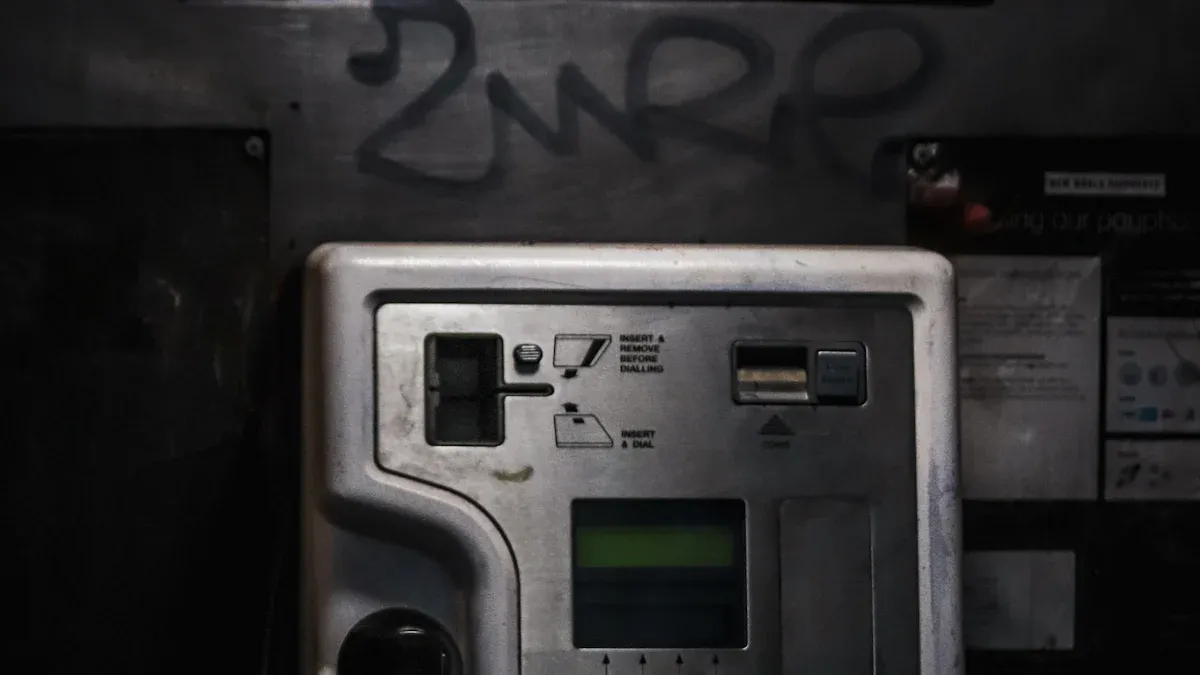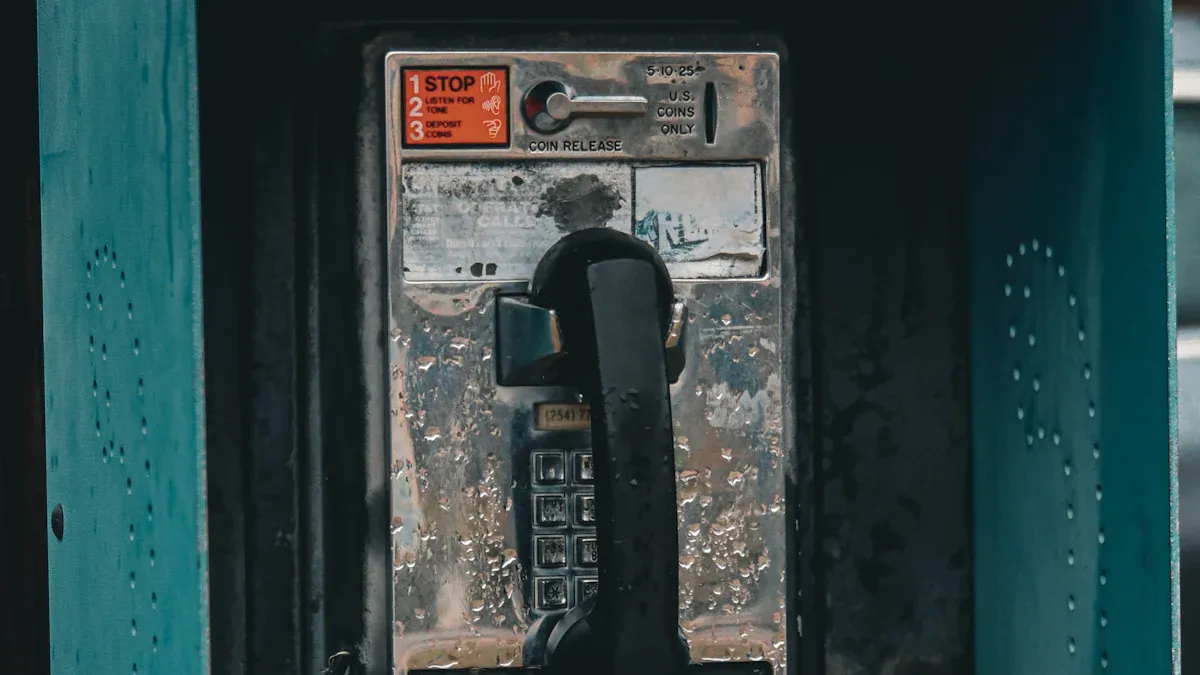
When working in rugged environments, communication tools need to be tough enough to handle the challenges. That’s where an IP65 telephone handset comes in. Whether you’re dealing with extreme weather, dusty conditions, or noisy surroundings, this type of handset is built to perform. The IP65 rating means it’s both dust-tight and protected against water, making it ideal for outdoor use. But how do you choose the right one? From a push to talk telephone handset to a fireman telephone handset, understanding your options is key. Additionally, consider the durability of a plastic telephone handset or the functionality of a public telephone handset. Let’s explore what matters most when selecting the best fit for your needs.
Key Takeaways
- An IP65 rating means the handset keeps out dust and water. It works well outdoors.
- Pick handsets made with strong materials so they last longer. Look for ones that resist shocks to stay in good shape.
- Clear sound is important in loud places. Choose handsets with noise-canceling features to hear better.
- Think about security features to stop tampering. This is helpful in public or risky areas.
- Always read product details and reviews to make sure the handset fits your needs.
Understanding the IP65 Rating

Breaking Down the IP65 Rating
When you see "IP65," it might look like just another technical term. But understanding what it means can help you make smarter choices. The "IP" stands for "Ingress Protection," which is a fancy way of saying how well something is sealed against solids and liquids. The two numbers after "IP" tell you the specifics.
- The first number, "6," means the device is completely dust-tight. No dust particles can sneak in, no matter how small.
- The second number, "5," shows that the device can handle water jets from any direction. While it’s not fully waterproof for submersion, it’s more than enough for rain or accidental splashes.
Tip: If you’re shopping for an IP65 Telephone Handset, this rating ensures it can handle tough environments without breaking down.
Relevance of IP65 for Outdoor Use
Why does the IP65 rating matter so much for outdoor use? Think about the challenges outdoor environments throw at your equipment. Dust storms, heavy rain, or even a quick hose-down during cleaning can damage regular devices. An IP65 Telephone Handset is built to survive these conditions.
Here’s why it’s perfect for outdoor settings:
- Dust Resistance: Outdoor areas, especially construction sites or industrial zones, are full of dust. The IP65 rating ensures no dust gets inside the handset, keeping it functional.
- Water Protection: Whether it’s a sudden downpour or water spray during maintenance, the handset stays safe. You won’t have to worry about water ruining your communication tool.
- Reliability: With this level of protection, you can count on the handset to work when you need it most, even in unpredictable weather.
Note: If you’re working in a rugged environment, choosing an IP65-rated handset means fewer worries about repairs or replacements.
Key Features of an IP65 Telephone Handset
Durability and Material Quality
When you’re choosing an IP65 Telephone Handset, durability should be at the top of your list. Rugged environments demand devices that can take a beating and still work flawlessly. That’s why the material quality matters so much. Look for handsets made from high-grade plastics or metals. These materials resist cracking, warping, and other damage caused by daily wear and tear.
Some handsets even feature reinforced casings. These add an extra layer of protection against accidental drops or impacts. If your handset will be used in industrial settings, this feature can save you from frequent replacements.
Tip: Always check the product specifications to see if the handset has been tested for shock resistance. This ensures it can handle the occasional bump or fall.
Weatherproof and Waterproof Design
Outdoor environments can be unpredictable. One moment it’s sunny, and the next, you’re dealing with rain or water sprays. An IP65 Telephone Handset is designed to handle these challenges. Its weatherproof design keeps it safe from extreme conditions, while its waterproofing protects it from water jets and splashes.
You don’t have to worry about dust clogging up the device either. The IP65 rating guarantees that no dust particles can enter the handset. This makes it perfect for construction sites, industrial zones, or any place where dirt and moisture are constant threats.
Note: While the handset can handle water jets, it’s not meant for full submersion. Avoid dropping it into pools or deep water.
Enhanced Audio Quality for Noisy Environments
Have you ever tried making a call in a noisy area? It’s frustrating when you can’t hear the other person clearly. That’s why enhanced audio quality is a must-have feature for an IP65 Telephone Handset. These handsets often come with noise-canceling microphones and high-quality speakers. They filter out background noise, so your conversations stay clear, even in chaotic settings.
This feature is especially useful in places like factories or construction sites. You won’t have to shout or repeat yourself, saving time and reducing stress. Some models even include volume controls, allowing you to adjust the sound to your liking.
Pro Tip: If you work in an extremely loud environment, look for handsets with advanced noise suppression technology. It makes a world of difference.
Tamper-Proof Features for Security
When you’re using an IP65 Telephone Handset in rugged environments, security becomes a top priority. You don’t want anyone tampering with your communication device, especially in critical areas like industrial sites or public spaces. That’s where tamper-proof features come into play. These features ensure your handset stays secure and functional, even in high-risk settings.
So, what makes a handset tamper-proof? Let’s break it down:
- Reinforced Casings: Many handsets come with tough, reinforced casings that resist physical damage. These casings make it nearly impossible for someone to open or damage the device without proper tools.
- Secure Mounting Options: Some models offer secure mounting brackets or enclosures. These prevent unauthorized removal or theft of the handset.
- Specialized Screws: Manufacturers often use tamper-resistant screws that require unique tools to access. This adds an extra layer of protection against tampering.
- Lockable Components: Certain handsets include lockable compartments for internal parts. This ensures that only authorized personnel can access sensitive components.
Tip: If your handset will be installed in a public or high-traffic area, look for models with multiple tamper-proof features. This will save you from costly repairs or replacements.
Tamper-proof features aren’t just about physical security. They also protect the integrity of your communication system. For example, some handsets include software-based security measures. These can prevent unauthorized access to the device’s settings or functions. Together, these features ensure your handset remains reliable and secure, no matter where it’s installed.
By choosing a handset with robust tamper-proof features, you’re not just protecting the device. You’re also safeguarding the communication network it supports. This is especially important in environments where reliable communication is critical, like emergency response systems or industrial operations.
Environmental Considerations for Outdoor Use

Temperature Range and Climate Adaptability
Outdoor environments can be unpredictable. You might face scorching heat one day and freezing temperatures the next. That’s why it’s important to choose a handset that can handle extreme temperature ranges. Many IP65 Telephone Handsets are designed to work in temperatures as low as -20°F and as high as 140°F. This adaptability ensures the device won’t fail when the weather takes a turn.
If you’re in a region with frequent temperature fluctuations, look for models tested for thermal shock resistance. These handsets can handle sudden changes in temperature without cracking or malfunctioning. It’s one less thing to worry about when you’re working in tough conditions.
Tip: Always check the manufacturer’s specifications to confirm the temperature range before making a purchase.
Resistance to Dust and Water
Dust and water are two of the biggest threats to outdoor communication devices. Whether you’re on a construction site or near a water source, these elements can cause serious damage. An IP65-rated handset offers excellent protection. It’s completely dust-tight, so no particles can enter the device. Plus, it can withstand water jets from any direction, making it perfect for rainy or dusty environments.
This level of resistance means you can rely on the handset even in the harshest conditions. You won’t have to worry about dirt clogging the buttons or water ruining the internal components.
Note: While the handset is water-resistant, avoid submerging it in water. It’s built for splashes, not swimming!
Longevity in Harsh Conditions
Durability is key when you’re investing in outdoor equipment. You need a handset that can last for years, even in harsh conditions. Many IP65 Telephone Handsets are built with high-quality materials like reinforced plastics or metals. These materials resist wear and tear, ensuring the device stays functional over time.
Some models also include UV-resistant coatings. These protect the handset from sun damage, which is especially useful in sunny climates. By choosing a durable handset, you’ll save money on replacements and repairs in the long run.
Pro Tip: Look for handsets with warranties. A good warranty is a sign of quality and gives you peace of mind.
Common Use Cases for IP65 Telephone Handsets
Construction and Industrial Sites
Construction and industrial sites are some of the toughest environments for communication devices. Dust, debris, and loud machinery can make it hard to stay connected. That’s where an IP65 telephone handset shines. Its dust-tight design keeps particles out, ensuring the device works even in the grittiest conditions. Plus, its water-resistant build means it can handle splashes or rain without breaking down.
You’ll find these handsets especially useful for coordinating teams across large sites. Whether you’re managing a crane operator or checking in with a foreman, clear communication is essential. Many models also feature noise-canceling technology, so you won’t have to shout over the roar of heavy equipment. With an IP65-rated handset, you can focus on the job without worrying about your communication tools failing.
Outdoor Public Spaces
Public spaces like parks, train stations, and parking lots often require durable communication systems. These areas face constant exposure to weather and vandalism. An IP65 telephone handset is a reliable choice for these settings. Its rugged design resists tampering, while its weatherproof features ensure it stays operational in rain or shine.
In public spaces, these handsets are often used for emergency call points or customer assistance stations. For example, a traveler at a train station might use one to request help or report an issue. The handset’s durability means it can handle frequent use without wearing out. It’s a practical solution for keeping public spaces safe and connected.
Emergency and Safety Communication Systems
In emergencies, every second counts. That’s why reliable communication tools are critical. IP65 telephone handsets are often used in safety systems for fire stations, hospitals, and disaster response teams. Their robust design ensures they work even in extreme conditions, like during a storm or in a dusty environment.
These handsets are often installed in areas where quick access to communication is vital. For instance, a fireman telephone handset might be placed near emergency exits or in stairwells. Its tamper-proof features prevent unauthorized access, ensuring the device is always ready when needed. With an IP65-rated handset, you can trust that your safety systems will perform when it matters most.
Comparing IP65 with Other IP Ratings
IP54 vs. IP65: Key Differences
You might wonder, "What’s the difference between IP54 and IP65?" Well, it’s all about the level of protection. IP54 offers basic protection against dust and water splashes, but it’s not fully dust-tight. Some particles can still get inside, which might cause issues over time. It also only protects against water splashes, not jets of water.
On the other hand, IP65 is a big step up. It’s completely dust-tight, so no dust can enter the device. Plus, it can handle water jets from any direction. If you’re working in a dusty or wet environment, IP65 is the better choice.
Tip: Choose IP54 for indoor use or light outdoor conditions. Go with IP65 if you need something tougher for rugged environments.
IP65 vs. IP66: Choosing the Right Level of Protection
At first glance, IP65 and IP66 seem pretty similar. Both are dust-tight, but the difference lies in water resistance. IP65 can handle water jets, while IP66 takes it a step further. It’s designed to withstand more powerful water jets, making it ideal for areas with heavy water exposure, like industrial washdowns.
If your work involves frequent exposure to high-pressure water, IP66 might be worth the upgrade. But for most outdoor environments, IP65 provides more than enough protection.
Note: Unless you’re dealing with extreme water pressure, IP65 is usually sufficient and more cost-effective.
IP65 vs. IP67: Understanding the Trade-Offs
Here’s where things get interesting. IP67 offers the same dust-tight protection as IP65 but adds the ability to survive temporary submersion in water. That’s great if you’re working near water sources or in flood-prone areas. However, this extra feature often comes with a higher price tag.
For most outdoor applications, IP65 strikes the perfect balance between durability and cost. But if water submersion is a real concern, IP67 might be worth the investment.
Pro Tip: Think about your specific needs. If your handset won’t face submersion, IP65 is the smarter, budget-friendly option.
Tips for Choosing the Right IP65 Telephone Handset
Evaluating Product Specifications and Certifications
When picking an IP65 Telephone Handset, start by checking the product specifications. These details tell you what the handset can handle. Look for features like dust-tight sealing, water resistance, and durability. If the specs mention shock resistance or thermal adaptability, that’s a bonus. These features ensure the handset can survive tough conditions.
Certifications are just as important. They prove the handset meets industry standards. For example, an IP65 rating guarantees protection against dust and water jets. Some handsets also come with certifications for safety or environmental compliance. These certifications give you confidence that the product is reliable and built to last.
Tip: Always read the product manual or datasheet. It’s the best way to understand what the handset offers.
Checking User Reviews and Manufacturer Reputation
User reviews are a goldmine of information. They give you real-world insights into how the handset performs. Look for reviews that mention durability, sound quality, and ease of use. If multiple users praise the same feature, it’s likely a strong point of the product. On the flip side, watch out for repeated complaints.
The manufacturer’s reputation matters too. A trusted brand is more likely to deliver quality products. Check if the company offers good customer support or warranties. These extras show they stand behind their products.
Pro Tip: Don’t just rely on reviews from the manufacturer’s website. Explore independent review platforms for unbiased opinions.
Considering Specific Use Cases and Budget
Think about where and how you’ll use the handset. Will it be in a noisy factory or a public park? Different environments have different needs. For example, a handset with noise-canceling features works best in loud areas. If security is a concern, choose one with tamper-proof features.
Budget is another key factor. While it’s tempting to go for the cheapest option, remember that quality often comes at a price. A durable handset might cost more upfront but save you money on repairs or replacements later.
Note: Match the handset’s features to your specific needs. This way, you get the best value for your money.
Choosing the right IP65 Telephone Handset is crucial for rugged environments. Its dust-tight and water-resistant design ensures reliable performance in tough conditions. When selecting one, focus on durability, environmental resistance, and compatibility with your specific needs. Whether you’re working on a construction site or setting up emergency communication systems, the right handset can make all the difference. Take the time to evaluate your options and prioritize quality. A well-informed decision will save you time, money, and frustration in the long run.
FAQ
What does "IP65" mean in simple terms?
IP65 means the device is fully protected from dust and can handle water sprayed from any direction. It’s not waterproof for submersion, but it’s perfect for outdoor use in rain or dusty conditions.
Tip: Think of IP65 as a shield against dust and water splashes, not deep dives!
Can I use an IP65 telephone handset in freezing temperatures?
Yes, most IP65 handsets work in extreme cold, often as low as -20°F. Always check the product’s temperature range to ensure it fits your environment.
Note: If you’re in a freezing climate, look for models tested for thermal shock resistance.
Is an IP65 handset suitable for industrial sites?
Absolutely! IP65 handsets are built for rugged environments like industrial sites. They resist dust, water, and impacts, making them reliable for tough conditions.
- Key Features for Industrial Use:
- Dust-tight design
- Water-resistant casing
- Noise-canceling microphones
How do I maintain an IP65 telephone handset?
Maintaining an IP65 handset is simple. Wipe it with a damp cloth to remove dirt. Avoid submerging it in water or using harsh chemicals.
Pro Tip: Regular cleaning keeps the handset functional and extends its lifespan.
What’s the difference between IP65 and IP67?
IP65 protects against dust and water jets, while IP67 adds protection for temporary water submersion. If you don’t need submersion resistance, IP65 is more cost-effective.
| Feature | IP65 | IP67 |
|---|---|---|
| Dust-tight | ✅ | ✅ |
| Water jets | ✅ | ✅ |
| Submersion | ❌ | ✅ |
Reminder: Choose based on your specific needs and budget.


